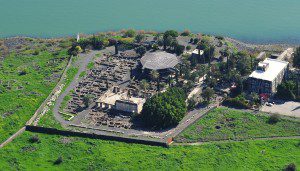
(Please click to enlarge. Click again to enlarge further.)
The entrance to the site is by the building on the right. The white area is the ruins of the ancient synagogue; the saucer-like roof behind the synagogue belongs to a modern Franciscan church covering the ruins of what is believed (and what I believe) to be the house of the apostle Peter.
It’s one of my favorite sites in Israel.
The notion that “a prophet is not without honor except in his own country” strikes me as entirely human and very plausible. Familiarity, the saying goes, breeds contempt. Not in everybody, of course. But for many, I’m sure, it’s much easier to believe in prophets and apostles who are very distant from us, either in time or in space or both, than it would be — than it is — to believe in apostles and prophets that we ourselves can see and know. That Peter might have been a true apostle is believable, but not that this particular rough-handed fisherman whom we’ve known for years could be God’s choice to head the church. Him? we would think to ourselves? Him? Seriously?
It reminds me a bit of the old proverb, possibly French, that says “No man is a hero to his valet.” To which the appropriate response is that the difficulty that valets might have in respecting the people to whom they’re very close doesn’t mean that there really are no heroes. It simply means that some men are valets.
To change the subject a bit: Capernaum, a tiny fishing village on the western shore of the Sea of Galilee, will become the headquarters of the Christian movement during its very first years. Peter lived there, and Jesus stayed with him while in town.











